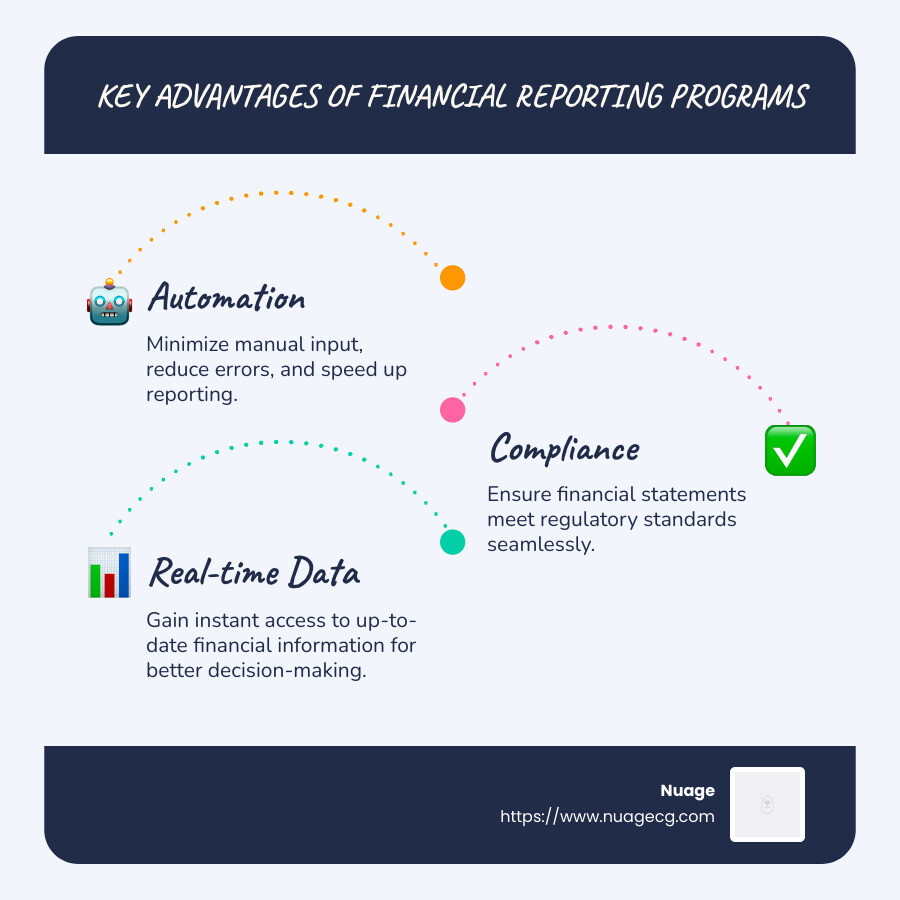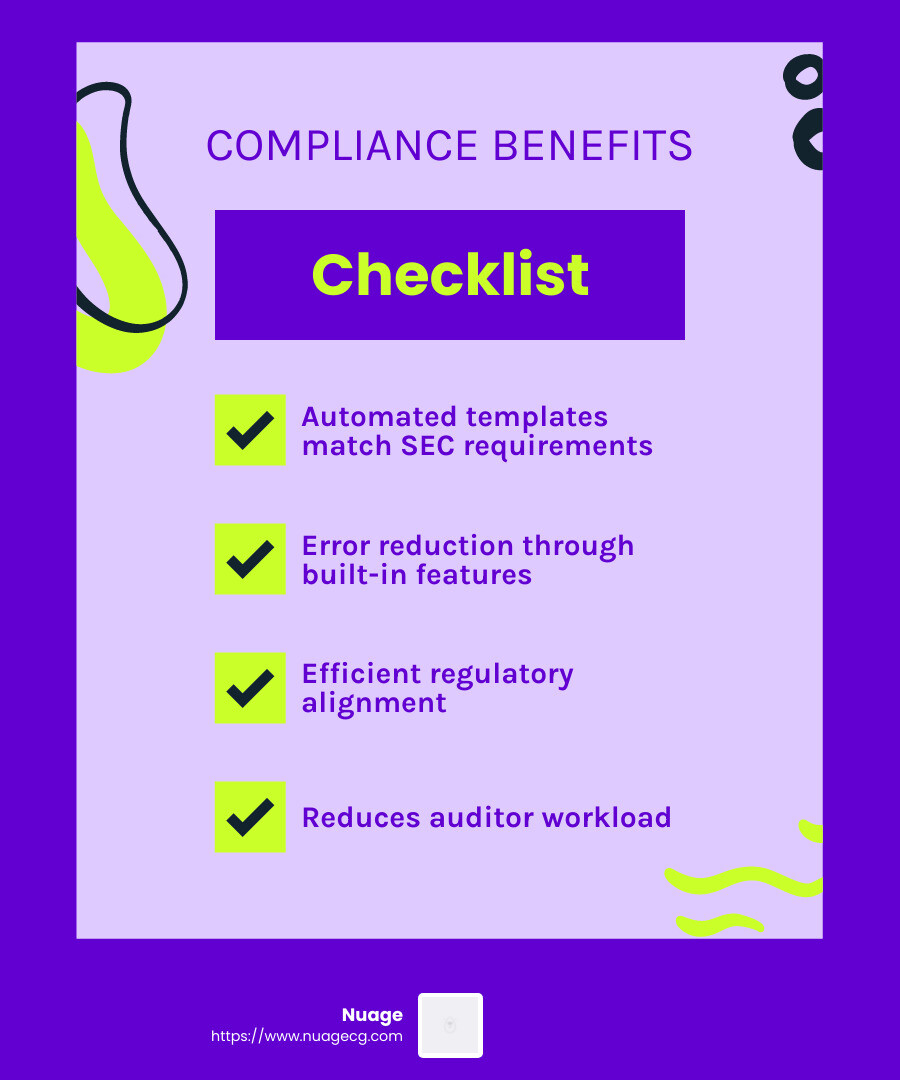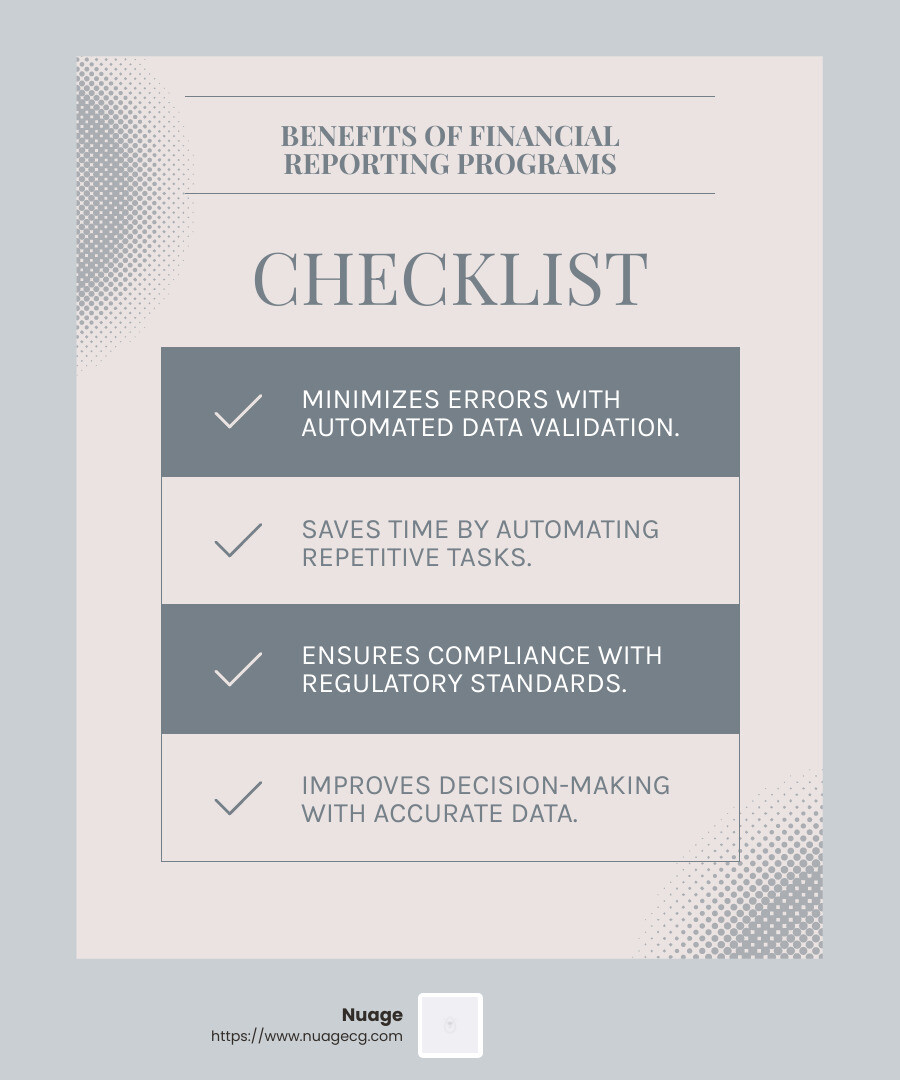Embracing Financial Reporting Programs in the Digital Age
Financial reporting programs have become essential tools for modern businesses navigating today’s digital landscape. These programs streamline the way companies track, analyze, and present their financial health. If you’re looking for a quick overview of what these programs offer, here’s a concise breakdown:
- Automation: Minimize manual input, reduce errors, and speed up reporting.
- Compliance: Ensure that financial statements meet regulatory standards seamlessly.
- Real-time Data: Gain instant access to up-to-date financial information for better decision-making.
- Integration: Seamlessly blend with existing accounting systems like NetSuite.
Adopting the right financial reporting programs can transform not just how your finance team works, but how your whole business makes decisions. From integrating with ERP systems like NetSuite to providing insights through advanced analytics, these programs are pivotal in driving efficiency and accuracy.
My name is Louis Balla, and as a partner at Nuage, I’ve spent over 15 years helping businesses accept digital change, especially in tailoring financial reporting programs that fit strategic goals. Whether you’re looking to improve system capabilities or streamline financial processes, I’m thrilled to guide you through this essential technological journey.

Quick financial reporting programs terms:
– suite analytics
– suite analytics connect
– netsuite sales reports
Understanding Financial Reporting Programs
Financial reporting programs are crucial for businesses aiming to maintain accuracy and transparency in their financial activities. Let’s explore how these programs help with financial statements, compliance, and automation.
Financial Statements: The Backbone of Reporting
Financial statements are the foundation of any reporting program. They include:
- Balance Sheets: Show what a company owns and owes at a specific time.
- Income Statements: Detail revenue and expenses over a period, highlighting profitability.
- Cash Flow Statements: Track the cash entering and leaving a business, ensuring liquidity.
- Equity Statements: Reflect changes in owners’ equity over time.
These statements provide a snapshot of a company’s financial health, helping stakeholders make informed decisions.
Compliance: Meeting Regulatory Standards
Meeting regulatory standards is a significant aspect of financial reporting. Programs like NetSuite ensure that businesses adhere to compliance requirements effortlessly. They come with built-in features that align with regulations, reducing the risk of errors and penalties.
For instance, in the U.S., companies with over $10 million in assets must file reports with the SEC. Automated templates in these programs match SEC requirements, saving time and reducing auditor workload.

Automation: Streamlining Processes
Automation is a game-changer in financial reporting. It minimizes manual data entry, reduces errors, and speeds up the entire reporting process. With automation, businesses can:
- Generate Reports Quickly: Automated tools prepare financial statements with precision and consistency.
- Ensure Data Accuracy: Built-in control checks verify data integrity, providing peace of mind.
- Focus on Strategy: With routine tasks automated, finance teams can concentrate on strategic activities.
For example, Deloitte’s automated financial statement preparation tool simplifies the process, ensuring precision every time.
In conclusion, understanding the role of financial reporting programs in handling financial statements, ensuring compliance, and leveraging automation is key to optimizing your financial operations. As we dig deeper into these programs, you’ll find the features that make them indispensable.
Key Features of Financial Reporting Programs
When it comes to financial reporting programs, understanding their key features is essential. These programs do more than just crunch numbers; they transform raw data into actionable insights. Let’s explore the core features that make these programs indispensable for any business.
Balance Sheets: A Snapshot of Financial Health
Balance sheets are like a financial selfie. They show what a company owns (assets) and owes (liabilities) at a specific point in time. This snapshot helps businesses understand their financial position and make informed decisions.
Key elements include:
- Assets: Everything the company owns, from cash to inventory.
- Liabilities: What the company owes, including loans and accounts payable.
- Equity: The owner’s stake in the company.
With financial reporting programs like NetSuite, businesses can generate balance sheets effortlessly, ensuring accuracy and compliance.
Income Statements: Tracking Profitability
Income statements, also known as profit and loss statements, detail a company’s revenues and expenses over a period. They highlight profitability and help identify areas for improvement.
Components include:
- Revenue: Money earned from sales or services.
- Expenses: Costs incurred, such as salaries and rent.
- Net Income: The bottom line – profit or loss.
Cash Flow: Monitoring Liquidity
Cash flow statements track the cash entering and leaving a business. They ensure the company has enough liquidity to meet its obligations.
Sections include:
- Operating Activities: Cash generated from core business operations.
- Investing Activities: Cash used for investments in assets.
- Financing Activities: Cash from or used in financing, like loans or dividends.
Automated cash flow tracking in financial reporting programs provides real-time insights, helping businesses stay on top of their financial game.
Multi-User Access: Collaboration Made Easy
In today’s business environment, collaboration is key. Financial reporting programs offer multi-user access, allowing teams to work together seamlessly.
Benefits include:
- Real-Time Updates: Everyone sees the latest data, reducing the risk of errors.
- Role-Based Access: Customize access levels to ensure data security.
- Efficient Collaboration: Teams can work on reports simultaneously, speeding up the process.
With these features, financial reporting programs like NetSuite improve productivity and ensure everyone is on the same page.
In summary, the key features of financial reporting programs – balance sheets, income statements, cash flow tracking, and multi-user access – are essential for modern businesses. These tools not only improve accuracy but also improve collaboration and decision-making. Next, we’ll explore the top programs in the market and how they can benefit your business.
Top Financial Reporting Programs
In today’s business world, choosing the right financial reporting program can make all the difference. Let’s explore some top programs and what makes them stand out.
Real-Time Updates: Stay Ahead of the Game
Imagine having the power to see your financial data as it changes. Real-time updates in financial reporting programs allow businesses to make quick, informed decisions. Programs like NetSuite offer real-time insights, enabling companies to track trends and respond promptly to financial issues. This capability is crucial for maintaining a competitive edge and ensuring that decisions are based on the most current data.
Customizable Reports: Custom to Your Needs
Every business is unique, and so are its reporting needs. Customizable reports allow companies to tailor data presentations to fit specific requirements. Flexible reporting tools enable users to adjust layouts, filter information, and create reports that highlight the most relevant data for their audience. This customization ensures that stakeholders receive the information they need, in the format they prefer.
Integration: Seamless Connectivity
Integration is a cornerstone of effective financial reporting. Programs that integrate well with existing systems reduce manual data entry and the risk of errors. NetSuite excel in this area, offering seamless connections to various business tools. This integration capability ensures that all financial data flows smoothly across platforms, providing a comprehensive view of the business.
The Power of Automation
Automation is another game-changer. By automating repetitive tasks, financial reporting programs save time and reduce the likelihood of human error. This means finance teams can focus on more strategic activities, like analyzing trends and planning for the future. Automated features streamline processes and make reporting more efficient.
In summary, top financial reporting programs like NetSuite offer real-time updates, customizable reports, and seamless integration. These features not only improve accuracy and efficiency but also empower businesses to make informed decisions quickly. We’ll dive into the benefits of using these programs and how they can transform your business operations.
Benefits of Using Financial Reporting Programs
In today’s complex business environment, financial reporting programs are essential tools for companies aiming to improve efficiency, accuracy, and compliance. Let’s explore how these programs can transform your business operations.
Error Reduction: Minimizing Mistakes
Mistakes in financial reporting can be costly. Imagine a decimal point error turning a small profit into a huge one. Financial reporting software helps prevent such errors by automating data entry and validation. As highlighted by Thomson Reuters, these tools perform validation checks and provide clear audit trails, ensuring that numbers align correctly. By catching errors early, companies save time and resources, while increasing trust in their financial data.
Time Savings: Boosting Efficiency
Time is money, and financial reporting programs save plenty of both. By automating repetitive tasks like bank reconciliation and report generation, these programs free up valuable time for finance teams. According to NetSuite, automation accelerates many accounting processes, from entering transactions to generating reports. This efficiency allows teams to focus on strategic activities, such as analyzing financial trends and planning for growth.
Compliance: Meeting Regulatory Standards
Compliance is a major concern for businesses, especially as regulations become more stringent. Financial reporting software ensures that companies meet these standards by automating data control checks and providing tools for accurate reporting. As Deloitte points out, automated processes not only save time but also ensure secure and accurate preparation of financial reports. For businesses operating internationally, these programs help steer complex tax regimes and accounting rules, reducing the risk of non-compliance.

The Bottom Line
By reducing errors, saving time, and ensuring compliance, financial reporting programs offer significant benefits. These tools empower businesses to make data-driven decisions, improve operational efficiency, and maintain regulatory compliance. As you consider which program best fits your needs, keep these benefits in mind to maximize your investment.
Next, we’ll discuss how to select the right financial reporting program for your business, considering factors like size, integration needs, and scalability.
Selecting the Right Financial Reporting Program
Choosing the right financial reporting program can feel like finding a needle in a haystack. But, by focusing on a few key factors, you can make an informed decision that fits your business needs.
Business Size Matters
The size of your business plays a big role in determining which software is best for you. Small businesses might prioritize simple sales tracking, while larger enterprises need complex cost accounting across multiple locations.
Small Retail Shops: These businesses often need basic features like sales tracking and tax reporting. A straightforward program that handles these tasks efficiently is ideal.
Large Enterprises: For bigger companies, scalability is crucial. They need software that can manage vast amounts of data and users without breaking a sweat. Look for solutions that offer advanced features and can grow with your business.
Integration Needs
Integration is another key consideration. Modern businesses use a variety of systems, and your financial reporting software should seamlessly connect with them.
ERP Integration: If you’re using platforms like NetSuite, ensure your financial reporting program can integrate smoothly. This eliminates the hassle of manual data entry and reduces errors.
E-commerce and Inventory: For businesses involved in online sales, integration with payment processors, inventory databases, and shipping logs is essential. This ensures real-time updates and accurate financial tracking.
Scalability: Growing with Your Business
Your software should not only meet your current needs but also be ready to grow with you. Scalability ensures that as your business expands, your financial reporting program can handle increased data, users, and workloads.
Flexible Features: Look for software that allows you to add new functionalities through modules or integrations as your business evolves.
User Capacity: Ensure the software can accommodate more users without compromising performance. This is especially important for growing teams that require simultaneous access to financial data.
By focusing on these factors—business size, integration needs, and scalability—you can select a financial reporting program that not only fits your current requirements but also supports future growth.
Next, we’ll address some frequently asked questions about financial reporting programs to further guide your decision-making process.
Frequently Asked Questions about Financial Reporting Programs
What are the four types of financial statements?
Financial statements are the backbone of any business’s financial reporting. They provide a snapshot of your company’s financial health. Here are the four main types:
- Balance Sheets: These give you a clear picture of what your business owns and owes. It shows assets, liabilities, and shareholder equity at a specific point in time.
- Income Statements: Also known as profit and loss statements, these detail your company’s revenues and expenses over a period. They help you see how much profit you’re making or if you’re in the red.
- Cash Flow Statements: These track the flow of cash in and out of your business. They help you understand how well your company manages its cash to fund operations and investments.
- Equity Statements: Sometimes called statements of changes in equity, they show changes in the owner’s equity over a period. They include items like net income and dividends.
How do financial reporting programs improve compliance?
Compliance is crucial for avoiding fines and maintaining trust with stakeholders. Financial reporting programs improve compliance in several ways:
- Automation: Automated processes ensure tasks are completed accurately and on time. This reduces the chances of human error, which can lead to compliance issues.
- Error Detection: Advanced programs use AI and machine learning to spot errors quickly. They alert you to discrepancies before they become bigger problems, ensuring your reports are accurate and compliant with regulations.
- Standardization: These programs often come with templates that align with regulatory standards, making it easier to prepare reports that meet legal requirements.
What should businesses consider when choosing a financial reporting program?
Choosing the right program involves considering several key factors:
- Integration: Make sure the program can integrate with your existing systems like NetSuite. This ensures smooth data flow and reduces manual data entry.
- Scalability: As your business grows, your reporting needs will change. Choose a program that can scale with you, adding users and features as needed.
- User-Friendliness: Even the most powerful software is useless if your team can’t use it. Look for programs with intuitive interfaces and good customer support.
- Cost-Effectiveness: While you shouldn’t skimp on quality, ensure the program fits your budget and provides good value for money.
By understanding these elements, you can choose a financial reporting program that not only meets your current needs but also supports your business as it grows and evolves.
Next, we’ll dive into the conclusion, exploring how Nuage’s expertise in ERP solutions like NetSuite can help you make the best choice for your financial reporting needs.
Conclusion
Choosing the right financial reporting program is crucial for any business aiming to maintain compliance, reduce errors, and save time. At Nuage, we specialize in guiding businesses through this decision, leveraging our extensive expertise in ERP solutions like NetSuite.
Nuage: Your Partner in Digital Change
With over 20 years in the ERP business, we understand that no two businesses are the same. Our approach is custom to your specific needs, whether you’re in manufacturing, food and beverage, or another industry. We don’t just sell software; we help you select, implement, and support the best solutions for your business.
Expertise in NetSuite
Our partnership with NetSuite allows us to offer robust solutions that integrate seamlessly with your existing systems. These platforms provide real-time updates, customizable reports, and scalable solutions that grow with your business.
As a cloud-based ERP, NetSuite offers flexibility and accessibility, making it ideal for businesses of all sizes. Its real-time data capabilities and user-friendly interface ensure you have the insights you need when you need them.
Why Choose Nuage?
Our clients trust us because we deliver results. We focus on solutions that are not only effective but also easy to use and integrate. Our team is dedicated to ensuring your financial reporting is accurate, timely, and compliant, freeing you to focus on growing your business.
Ready to transform your financial reporting? Contact us today to learn how Nuage can help you harness the power of NetSuite for your business.
